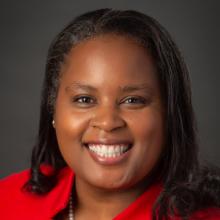Advancing gender equity through medical education, leadership development and medical practice
The annual Women in Medicine Month webinar, sponsored by the Women Physicians Section (WPS), celebrates women physicians, residents and students. This Sept. 17, 2021, webinar explored ways that medical education, leadership development and medical practice can help promote gender equity in medicine.
Presenter
Margot L. Savoy, MD, MPH, FAAFP
Dr. Savoy is the senior vice president of education at the American Academy of Family Physicians (AAFP) and organizational champion for Physicians Health First (an initiative to help family physicians address burnout and improve well-being). At Temple University, she serves as associate professor, Family & Community Medicine and Urban Bioethics & Population Health (Lewis Katz School of Medicine) and adjunct associate professor (Maurice H. Kornberg School of Dentistry).
Moderator
Sarah Swiezy
Ms. Swiezy is a fourth-year medical student in the Rural Medical Education Program at Indiana University School of Medicine. She will be applying to OB/GYN residency this fall. She has been involved in the AMA since beginning medical school, and she currently serves as the medical student representative on the WPS Governing Council.
Q&A summary
Swiezy: How do you suggest we approach these issues of gender inequity and imposter syndrome to speak up on things that we are really passionate about as a medical student?
Dr. Savoy: Medical students and residents are often in a difficult spot due to being evaluated by the folks you are often criticizing. I don’t think there is one right answer for everyone because I appreciate that there are privileges afforded to some that are not extended to others. Even on a good day with no controversy, I was often tagged as being angry or not cooperative just for showing up. I’m still not sure if I just have a resting frowning face, my lack of being a morning person or the fact that I tend to be an outspoken Black woman but that has been a serious challenge for me throughout my whole career, but I digress.
The idea of launching into a large speech about inequality to my medical team as a student would likely have not served my long game very well. On the other hand, serving on the policy-making committees for the medical school and hospital allowed me space and the ear of people with more power than me to affect change. As I got more confident in my own presence as a leader, woman and physician, I found my voice is best heard when I focus differently on my delivery. Regardless of whether I think it is fair that it is hard for people to hear me or take in my feedback, if that is the truth, I could spend time fighting that or I could reframe and perhaps move my concern forward faster.
One example, as a resident I found a particular nurse manager to be hostile to certain groups of people both in public and privately. I took offense. I told her so loudly and in a public space. It embarrassed her and she retaliated, which ultimately landed me in the OB-GYN chair’s office and later my program director’s office. Both of them hearing my story said essentially the same thing—you started as the one with the high road and you destroyed my ability to support you the moment you crossed the line and triggered the disruptive physician concerns. I was frustrated and angry. I left feeling like my voice was silenced. More mature Margot sees that situation differently now. It wasn’t that I had to remain silent and suffer. I also did not pick the wisest approach to get my concern met. I needed to be strategic and understand how to navigate my potential allies in a different way. I needed to remain respectful. I needed to choose the appropriate moment. I needed to have true allies and help them help me. And I needed to be intentional—picking the hills and battles I am willing to fight on carefully.
Swiezy: Can you say more about your unique career path and risks you took that accelerated your career or opened doors that would have otherwise remained shut?
Dr. Savoy: This is such a great question! I will fully admit that I often have made decisions that at the time didn’t seem like a risk but in retrospect were really a leap of faith. I was raised with a belief that most things in this world are mine for the taking. You won’t get what you don’t apply for or ask for. Some people are lucky enough to have others (we now call these folks sponsors) who are constantly bringing them opportunities to grow, develop and be seen. I can’t always rely on that. Not that I knew back then that Black women rarely have sponsors but I did notice that as a first-generation doctor, there was a lot that others just knew somehow that I was clueless about. I needed to keep my head on a swivel seeking out opportunities to be seen and learn more and that has continued throughout my career.
I stay reading and looking for interesting opportunities to grow myself and develop into the person, leader and doctor I want to be. Investing in myself has been critical even when I didn’t know what I would do with it later. If I wanted to learn more, I’ve just went ahead and done the fellowship or certificate or program. Sometimes I know what I think I want to do with the experience and knowledge. Often what it has helped me learn has been surprising and where it comes back to be helpful wasn’t something I could have planned for.
I apply for long shots even when my inner critic whispers imposter lies because sometimes, I underestimate my competitiveness. Throwing my name into the ring is often scary and I don’t want to experience the public rejection any more than anyone else. But I will say, more often than not, I got accepted for the things that were right for me in the long run and rejected from the things that really would have taken me away from where I needed to be. So be scared and do it anyway.
When I look back over my career, I think there were times where I stayed too long and passed on opportunities because I had more loyalty to an organization than to myself. I’m not suggesting that everyone quit their day jobs tomorrow. I am saying that if it isn’t serving your needs or allowing you to serve your passions then you need to take a hard look at that. If you are unsure, get yourself a coach to help you walk through your own wants, needs and personal leadership journey.
Swiezy: With regard to the issue of unequal pay, do you have any specific recommendations for how to enhance our female doctors' ability—and comfort level—with asking for what they are worth.
Dr. Savoy: This is a difficult question for me because while I value salary, I sometimes have made other choices based on what I personally need and value. For individuals, I recommend thinking about what you need to live your best life—for me that looks more like time-savers, parking and paid time off. For others that may look like real cash on the paycheck.
Ask for what you want and let them make the decision to tell you yes/no. And if you get a no, use the opportunity to negotiate to get other things that you want and need. Create a network of allies to give you level-setting data whenever possible. For example, try not to go into a new job negotiating salary without some information about the industry standard. I have often found myself stunned at the side benefits and salary things my colleagues have asked for and gotten over the years. Sometimes those things have looked like an investment into the person such as personal leadership coaching which I find we rarely think to ask for.
On the larger front, I think we need to continue to advocate for transparency and as we take on roles being intentional about doing the hard work to address the disparities. When you get into the position to control salaries you can make a difference where you are by level setting, closing gaps and making people whole.





